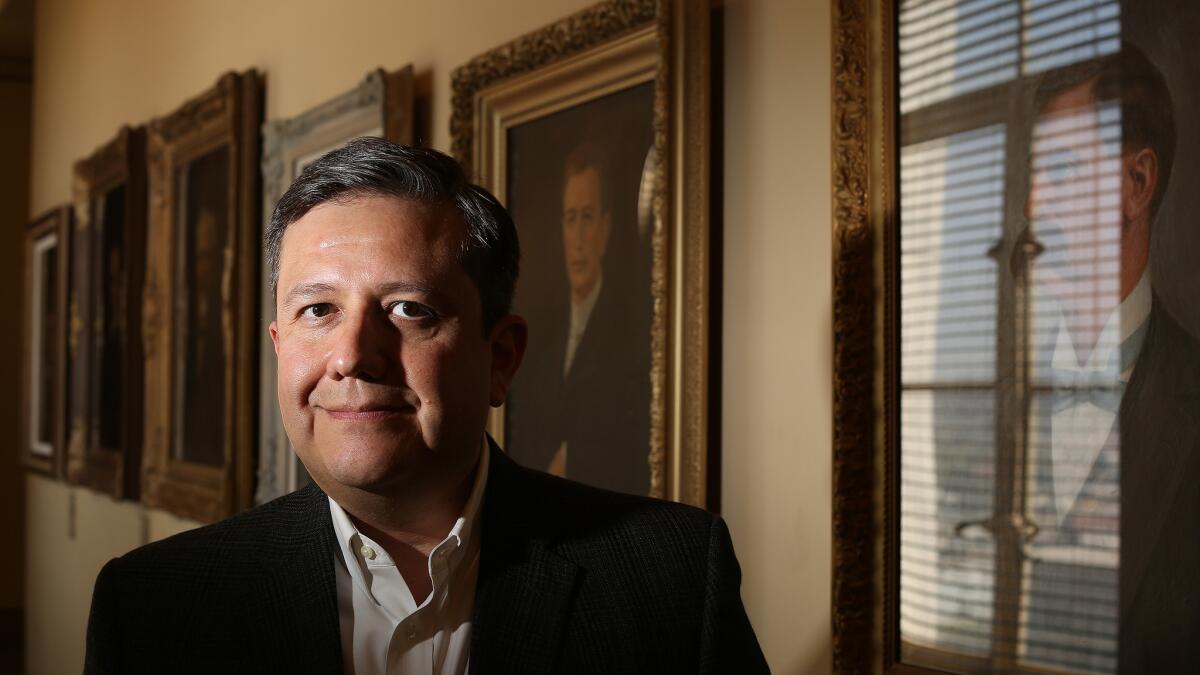Miguel Santana is new leader of Weingart Foundation

- Share via
The real estate developer Ben Weingart made his fortune building Lakewood and other communities around Los Angeles.
Now his legacy is taking a quintessentially Southern California turn as the $800-million foundation that bears his name is set to pass its leadership to an L.A. County native whose Mexican-immigrant parents would not have been welcome in one of Weingart’s communities.
“Weingart really represented the entrepreneurial spirit, and he’s the L.A. story of his generation,” said Miguel Santana, a former high-level administrator in both the city and county, whose appointment as the next president and chief executive of the Weingart Foundation is being announced Tuesday.
But the Whitter College alum noted with some relish that, because of discrimination, he and his family likely wouldn’t have been allowed to live in the developments the foundation’s namesake built in the mid-20th century.
“I really love the fact that I’m running a foundation with his name that was made from a fortune of housing that I would not have been able to buy,” Santana, 51, said in an interview. “I think there’s something really cool about that.”
Santana will succeed Fred Ali, who during a 21-year run as the head of the foundation diversified its once all-white board of male businessmen and played a key role in drawing the region’s other large philanthropic groups into collaborative initiatives to steer public policy.
“I will miss Fred intensely,” said Antonia Hernandez, president and chief executive of the California Community Foundation. “Fred has been a fantastic visionary leader in philanthropy, not only in L.A. but across the state.”
Hernandez said Santana is uniquely positioned to further that work because of his extensive experience in government.
“Miguel’s intimate knowledge of how the public sector works is going to benefit the growth of the relationship between philanthropy and the public sector,” she said.
“We’re losing a great leader, and we’re gaining a great leader,” said Robert K. Ross, president and chief executive of the California Endowment, who has served with Santana since 2016 on the Weingart Foundation’s board.
Santana’s decision to take over from Ali puts to rest widespread speculation that he was considering a run for public office. Those rumors ramped up in July after Santana announced he was stepping down as head of the nonprofit that runs the county fair.
Santana has been at the center of city and county political machinations for the last two decades. After beginning his career as community liaison at the Mexican American Legal Defense and Education Fund, he joined the staff of then-County Supervisor Gloria Molina, became her chief of staff, then rose in the county ranks to the position of deputy administrative officer.
In 2009 he became the Los Angeles city administrative officer and guided the city through the painful budget years of the Great Recession. While at City Hall, he became a prominent advocate for public action to address homelessness and was a lead architect of the $1.2-billion homeless housing bond measure, Proposition HHH. After leaving his city post, he spent two years as chairman of the volunteer citizens committee overseeing the bond program.
In an interview, Santana said replacing Ali offered a chance to continue the work on homelessness, which includes grants awarded by the foundation to help fund housing projects and groups that provide services to the homeless.
Santana will assume the $510,000-a-year position when Ali, 70, steps down in February. Ali, who worked for almost 20 years at nonprofits in Alaska and ran Covenant House in Los Angeles prior to becoming Weingart president in 1999, said he will continue to be engaged in philanthropic work.
During Ali’s tenure, Los Angeles’ network of philanthropic foundations collaborated more closely with one another and government agencies.
“You’ve had a number of the foundations that have really emerged to be civic leaders and not just writing checks,” said James M. Ferris, the founding director of the center on Philanthropy and Public Policy at the University of Southern California.
Nowhere has that collaboration been more apparent than in the fight to combat homelessness, Ferris said.
The Weingart Foundation joined forces with the California Community Foundation, the California Endowment and other nonprofits to play a leading role in getting the HHH housing bond passed. They worked closely with Santana in his role at the city to design the ballot measure that passed in 2016. While the bond was pitched to voters as a solution to chronic homelessness in the city, progress toward building thousands of apartments for those without shelter has been slow.
Serving on the oversight committee for the program was enlightening, Santana said. The experience led him to realize that government at all levels had failed to develop sustainable, effective ways to build the enormous amount of affordable housing needed to get the most vulnerable off the street. In this new role, he said he hopes he can keep working to finding ways to build cheaper housing.
It is clear now to Santana that the thousands of apartments being built with the bond money will fall short because “we didn’t create a new model for how to build permanent supportive housing.”
Santana’s shift to the nonprofit was foreshowed earlier this year when he was recruited to head a group of philanthropic leaders planning for the region’s recovery from the coronavirus epidemic.
The group morphed into the Committee for Greater LA, which produced a sweeping report, “No Going Back,” that documented the breadth of racial and economic inequities and recommended dozens of policy shifts that are needed to correct them.
A new report paints a dark picture of racial and economic inequity in Los Angeles and recommends an overhaul
The deft way Santana handled the committee’s weekly Zoom meetings made an impression on Charisse Bremond Weaver, president and CEO of the Brotherhood Crusade.
“His leadership touched me,” Bremond Weaver said. “Every week his ability to frame the conversation around why we cannot go back, and we need to do more. It’s really clear that the Weingart succession plan will be good for our city.”
More to Read
Sign up for Essential California
The most important California stories and recommendations in your inbox every morning.
You may occasionally receive promotional content from the Los Angeles Times.









